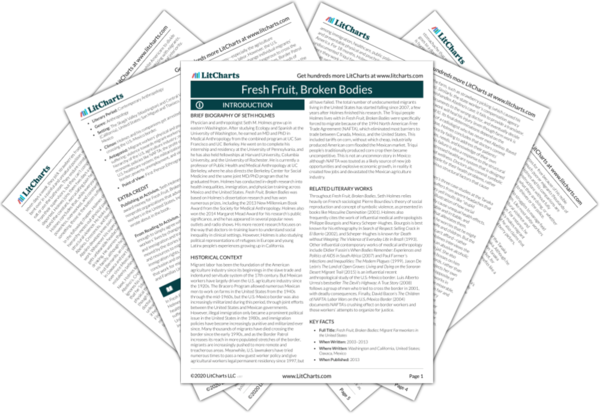Crescencio Quotes in Fresh Fruit, Broken Bodies
The suffering of Triqui migrant laborers is an embodiment of multiple forms of violence. The political violence of land wars has pushed them to live in inhospitable climates without easy access to water for crops. The structural violence of global neoliberal capitalism forces them to leave home and family members, suffer through a long and deadly desert border crossing, and search for a means to survive in a new land. The structural violence of labor hierarchies in the United States organized around ethnicity and citizenship positions them at the bottom, with the most dangerous and backbreaking occupations and the worst accommodations. Due to their location at the bottom of the pecking order, the undocumented Triqui migrant workers endure disproportionate injury and sickness.
Crescencio's headache is a result most distally of the international economic inequalities forcing him to migrate and become a farmworker in the first place and more proximally of the racialized mistreatment he endures in the farm's ethnicity and citizenship hierarchy. These socially produced headaches lead Crescencio to become agitated and angry with his family and to drink, thus embodying the stereotype of Mexican migrants as alcoholic and potentially violent. The racialized mistreatment that produces his headaches is then justified through the embodied stereotypes that were produced in part by that mistreatment in the first place. Finally, due to powerful economic structures affecting the migrant clinic as well as limited lenses of perception in biomedicine, this justifying symbolic violence is subtly reinforced throughout Crescencio's health care experiences.
If health professionals responded to sickness by treating not only its current manifestations but also its social, economic, and political causes, we could create a realistically critical public health and a "liberation medicine." This latter term alludes to liberation theology, in which a reflective engagement with those who are poor and suffering leads to new ways of thinking and practicing theology in order to achieve social justice. While there is genuine need for the skills of narrowly trained, competent biomedical physicians, I am convinced this is not enough.
As shown by the health care experiences of Abelino, Crescencio, and Bernardo, medical skills practiced without recognition of the social structures causing sickness are doomed to address only the downstream, biological and behavioral inputs into disease. This leads to ineffective health care at best and complicit, injurious health care at worst.

Crescencio Quotes in Fresh Fruit, Broken Bodies
The suffering of Triqui migrant laborers is an embodiment of multiple forms of violence. The political violence of land wars has pushed them to live in inhospitable climates without easy access to water for crops. The structural violence of global neoliberal capitalism forces them to leave home and family members, suffer through a long and deadly desert border crossing, and search for a means to survive in a new land. The structural violence of labor hierarchies in the United States organized around ethnicity and citizenship positions them at the bottom, with the most dangerous and backbreaking occupations and the worst accommodations. Due to their location at the bottom of the pecking order, the undocumented Triqui migrant workers endure disproportionate injury and sickness.
Crescencio's headache is a result most distally of the international economic inequalities forcing him to migrate and become a farmworker in the first place and more proximally of the racialized mistreatment he endures in the farm's ethnicity and citizenship hierarchy. These socially produced headaches lead Crescencio to become agitated and angry with his family and to drink, thus embodying the stereotype of Mexican migrants as alcoholic and potentially violent. The racialized mistreatment that produces his headaches is then justified through the embodied stereotypes that were produced in part by that mistreatment in the first place. Finally, due to powerful economic structures affecting the migrant clinic as well as limited lenses of perception in biomedicine, this justifying symbolic violence is subtly reinforced throughout Crescencio's health care experiences.
If health professionals responded to sickness by treating not only its current manifestations but also its social, economic, and political causes, we could create a realistically critical public health and a "liberation medicine." This latter term alludes to liberation theology, in which a reflective engagement with those who are poor and suffering leads to new ways of thinking and practicing theology in order to achieve social justice. While there is genuine need for the skills of narrowly trained, competent biomedical physicians, I am convinced this is not enough.
As shown by the health care experiences of Abelino, Crescencio, and Bernardo, medical skills practiced without recognition of the social structures causing sickness are doomed to address only the downstream, biological and behavioral inputs into disease. This leads to ineffective health care at best and complicit, injurious health care at worst.











